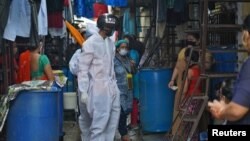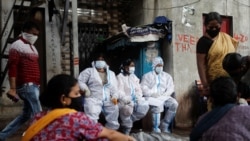A recent study of the poorest areas in India’s city of Mumbai found that more than half of the people have developed COVID-19 antibodies. It is a sign that some of India's most crowded settlements could be moving toward "herd immunity."
Herd immunity happens when enough people in a community become resistant to a disease that its spread becomes unlikely.
People in the slums may be developing immunity but Indian officials are not considering it a possibility for battling the spread of the virus. Officials say it could never be a choice but only a result.
India is a world hotspot for COVID-19. More than 1.6 million people have been infected with the new coronavirus.
The study in Mumbai found that 57 percent of people who had been tested in three slum areas had been exposed to the virus and had antibodies against it. That is compared to 16 percent exposure for people living in wealthier parts of the city.
This result means that the virus has spread more quickly through crowded slums. In these poor areas, up to 10 people live in small rooms, making physical distancing impossible.
Most of the people had no symptoms or showed very mild symptoms. So they were not tested earlier and did not appear in official counts of coronavirus cases.
Ullas Kolthur told VOA that it is safe to believe slums could reach herd immunity “sooner than later.” He is a professor at Tata Institute of Fundamental Research and one of the scientists who carried out the study on nearly 7,000 people.
Decreasing infections
Although Mumbai is one of India's worst-hit cities, COVID-19 numbers have begun to go down.
Infections in the city's slums which are home to about 5 million people have also shown a decrease in recent weeks, officials say.
The antibodies study was done by Mumbai's civic officials, the government policy research group Niti Aayog and the Tata Institute of Fundamental Research.
Kolthur said the results show that population density does affect the spread of COVID-19. As long as there is more contact between a population, the spread is high, he said, whether it is because of shared bathrooms or other shared areas.
In Mumbai, officials said they were surprised by the high numbers of people with no symptoms. Researchers also point to the infection death rate of less than 0.05 percent based on the official number of deaths in the slums.
People in Mumbai’s slums seem to have a much lower COVID-19 death rate, compared to other people, Kolthur said. “That is also very surprising, one would have expected it to be the other way around.” He said it might be because of the somewhat younger population that likely has better disease resistance, which “needs to be further investigated."
Antibody development
A government study carried out earlier in July in parts of the capital, New Delhi, found that one in four people there had developed antibodies.
As the two studies turn their attention to possible herd immunity, the health ministry said that such immunity can only be a result in a country like India with a huge population. It said herd immunity comes at a very high cost because it means many people would have to be infected.
Rajesh Bhushan is an officer on special duty in the health ministry. He said that the country must follow COVID-19 safety measures, like wearing face coverings, avoiding gatherings and washing hands carefully until a vaccine is approved.
Mumbai, like several other parts of the country, continues to enforce strong restrictions. Some critics say the results of the antibodies studies question the reasoning of social restrictions and should cause officials to restart economic activity.
The Times of India newspaper said in an opinion statement that the two studies’ results make “a strong case” for removing restrictions more quickly.
I’m Alice Bryant.
Anjana Pasricha reported this story for VOA News. Alice Bryant adapted it for Learning English. Mario Ritter, Jr. was the editor.
_______________________________________________________________
Words in This Story
slum –n. a neighborhood were buildings are in bad condition and people are very poor
hot spot –n. a place where there is danger of infection or fighting
expose –v. to be affected by, to come in contact with something like a virus
symptom –n. a change that is evidence that a disease is present
density –n. the number of, for example, people in a limited area
fatality –n. a death that results from an accident, disease or disaster






